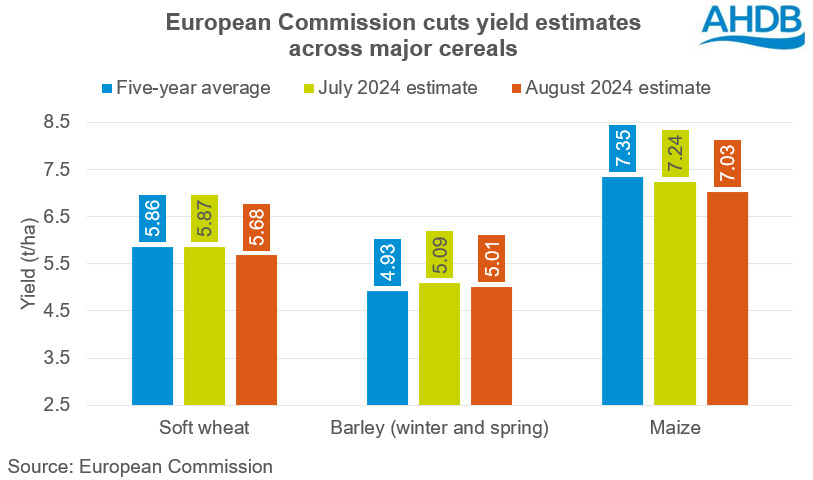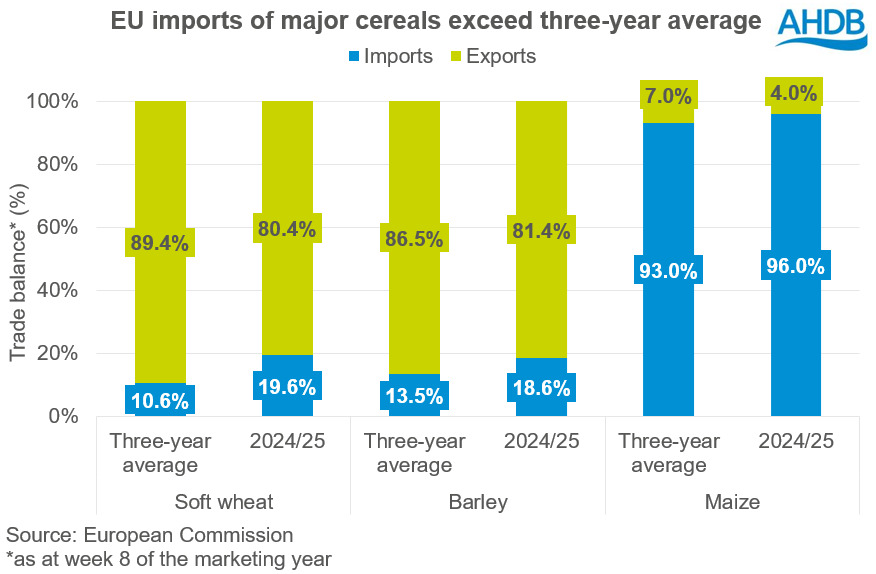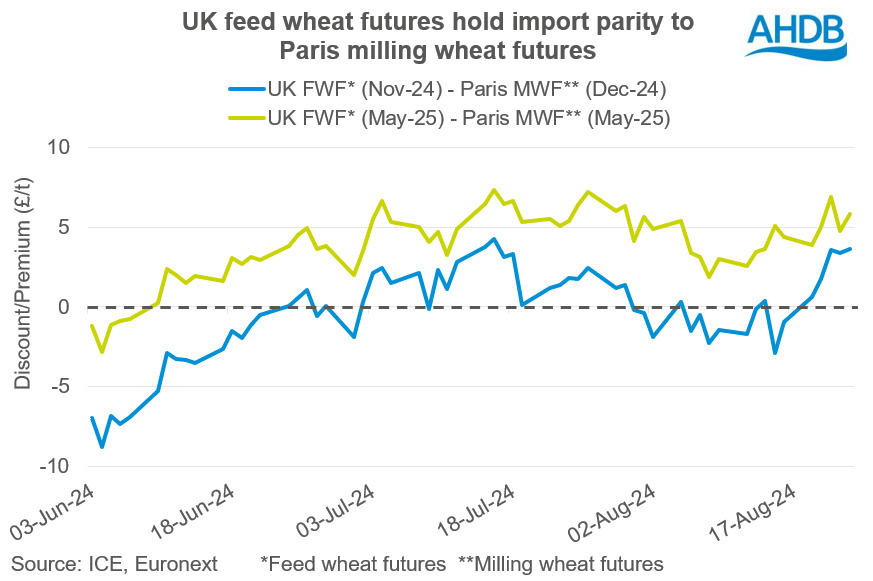Cereal production woes in EU as further yield cuts: Grain market daily
Wednesday, 28 August 2024
Market commentary
- UK feed wheat futures (Nov-24) closed at £179.90/t yesterday, falling £0.60/t from Friday’s close. The May-25 contract lost £0.90/t over the same period, to close at £191.75/t.
- UK feed wheat futures closed lower yesterday in contrast to Paris milling wheat futures and Chicago wheat futures as it also factored in the movements seen on Monday when it was not trading due to the bank holiday. Pressure on UK feed wheat futures came from continued competitiveness of Black Sea grain in addition to the strengthening of sterling in response to the weakening US dollar. While lower than expected crop condition scores for US corn and wheat offered some support.
- Paris rapeseed futures (Nov-24) closed at €463.75/t yesterday, gaining €3.75/t from Monday’s close. The May-25 contract gained €3.00/t over the same period, to close at €466.50/t.
- A strengthening in Chicago soyabean futures yesterday as a result of rising temperatures over the US Midwest offered support to the oilseed complex, including rapeseed.
Sign up to receive the Weekly Market Report and Grain Market Daily from AHDB.
Cereal production woes in EU as further yield cuts
On Monday (26 August), the European Commission released its monthly MARS report regarding crop development in EU member states and several neighbouring countries. Overall, the outlook for total cereals remains poor as the yield is estimated at 5.36 t/a, 0.12 t/ha below the five-year average.
While harvest remains underway on the continent, the European Commission has reduced yield estimates for soft wheat, barley (winter and spring), and maize.

As has been explained in previous MARS reports, the downward revision to winter crops has been largely attributed to excessively wet conditions across western and northern Europe, in addition to dry weather in eastern Europe.
Unfavourable weather conditions have continued during the summer where the Baltic countries experienced considerable rainfall which has led to lodging and impacting on grain quality. Furthermore, in the north-west of mainland Europe, rainfall has persisted and interrupted harvesting, leading to further pressure on crop conditions.
The downward revision to maize has come as a result of hot temperatures and limited water availability during July to mid-August in southern and eastern Europe.
EU importing more and exporting less
Recently, the EU has been importing more cereals in response to poorer production seen in numerous EU member states.

In comparison to the three-year average, as at the same time period, imports of soft wheat, barley, and maize are all greater in 2024/25.
UK wheat at import parity to Paris wheat
At the eighth week of the marketing year, wheat imports to the EU reached 955 Kt, while this is slightly lower than the pace last year (1022 Kt), this it still markedly above the three-year average of 608 Kt.
However, despite increased EU import demand, the UK has been unable to compete on soft wheat exports as UK feed wheat futures are currently priced at import parity to Paris milling wheat futures.

The current import parity has been supported by the below average UK wheat crop which, while quality is generally seen as positive considering conditions earlier in the year, the smaller planted area and lower average yield has hindered production.
How could this impact UK wheat exports
Although there is much variation across EU member states regarding the impact of the unfavourable weather conditions on cereal crops, the third consecutive cut to the total cereals yield highlights the persistence of the difficult conditions felt across Europe.
Despite the increased EU wheat imports this marketing year, given the UK’s current import parity to the continent, as well as the global competitiveness in the cereals market, it is currently unlikely to see a significant volume of UK wheat exported to the EU.
Sign up to receive the latest information from AHDB.
While AHDB seeks to ensure that the information contained on this webpage is accurate at the time of publication, no warranty is given in respect of the information and data provided. You are responsible for how you use the information. To the maximum extent permitted by law, AHDB accepts no liability for loss, damage or injury howsoever caused or suffered (including that caused by negligence) directly or indirectly in relation to the information or data provided in this publication.
All intellectual property rights in the information and data on this webpage belong to or are licensed by AHDB. You are authorised to use such information for your internal business purposes only and you must not provide this information to any other third parties, including further publication of the information, or for commercial gain in any way whatsoever without the prior written permission of AHDB for each third party disclosure, publication or commercial arrangement. For more information, please see our Terms of Use and Privacy Notice or contact the Director of Corporate Affairs at info@ahdb.org.uk © Agriculture and Horticulture Development Board. All rights reserved.

